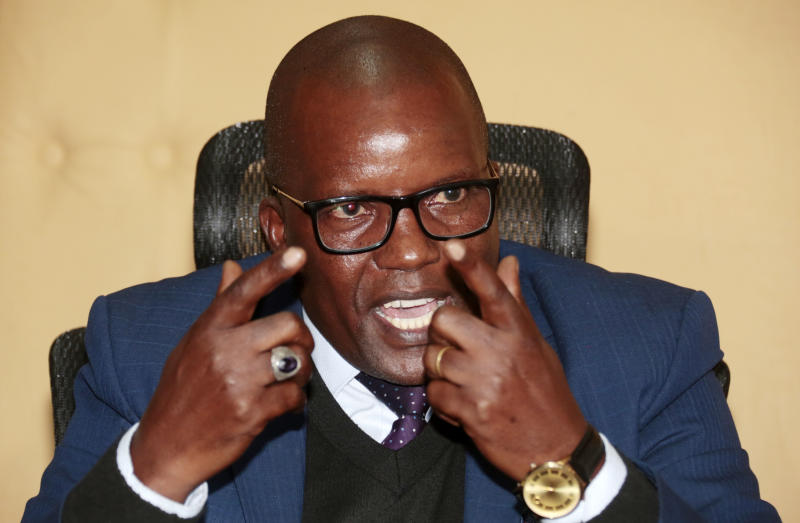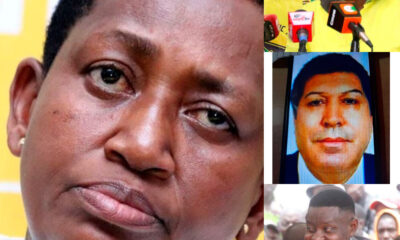Investigations
CEO Peter Mbugi On The Spot Over Bribery Claims Ahead Of Betting Firms License Renewal
The controversy surrounding the popular betting game Aviator has further fueled suspicions about Mbugi’s conduct.

The Betting Control and Licensing Board (BCLB) finds itself at the center of a brewing storm as damaging allegations emerge against CEO Peter Mbugi, casting a shadow over the regulator’s integrity just as the industry prepares for a crucial license renewal period.
Industry sources have painted a troubling picture of systematic corruption at the highest levels of Kenya’s betting regulator, with Mbugi accused of leveraging his position to extract millions from gambling operators seeking favorable treatment. The allegations come at a particularly sensitive time as the BCLB prepares to implement sweeping reforms that could reshape the entire industry landscape.
According to insiders familiar with the operations, Mbugi has allegedly been receiving substantial kickbacks from betting companies through a sophisticated network involving offshore dollar accounts. The scheme reportedly involves the CEO promising regulatory leniency and preferential treatment to firms willing to pay hefty bribes, while unleashing the full force of regulatory scrutiny on those who refuse to play along.
The timing of these revelations is particularly significant given the BCLB’s recent announcement of drastic changes to licensing requirements. The board is seeking to overhaul current licensing requirements, including raising the minimum capital investment to Sh50 million for betting firms, while online operators face a licensing fee hike to Sh200 million. Critics suggest these reforms may be strategically designed to eliminate smaller operators who cannot afford the new financial thresholds, potentially benefiting larger companies willing to pay under-the-table fees.
The controversy surrounding the popular betting game Aviator has further fueled suspicions about Mbugi’s conduct. The BCLB told MPs that the government collected Sh96 billion from betting companies in seven financial years as taxes, yet questions remain about why certain games and operators appear to receive preferential treatment. Industry watchers note that Mbugi’s explanation that Aviator cannot be controlled due to its foreign ownership seems inconsistent with the board’s aggressive stance against other international operators.
Sources within the betting industry describe a climate of fear and uncertainty, where operators must navigate not just regulatory compliance but also the informal demands of corrupt officials. The alleged corruption network reportedly extends beyond Mbugi himself, with claims that board directors have been compromised through financial incentives channeled through proxy companies and trust funds.
The BCLB board, chaired by Jane Makau and including directors Edwin Irungu, Ann Too, Janet Mwawasi, Ernest Kamau, and Innocent Muganda, faces mounting pressure to address these allegations. However, sources suggest that Mbugi has accumulated significant influence within the organization, potentially compromising the board’s ability to take decisive action.
These corruption allegations threaten to undermine the BCLB’s stated mission of cleaning up Kenya’s betting industry. The regulator has been vocal about its commitment to weeding out dubious operators and raising compliance standards, but the emergence of bribery claims suggests that the real problem may lie within the regulatory body itself.
As the industry awaits the implementation of new licensing requirements and the renewal of existing permits, betting companies find themselves in an uncomfortable position. Those who have allegedly paid bribes fear exposure, while compliant operators worry about facing unfair disadvantage in a system where corruption appears to have taken root.
The revelations about Mbugi’s alleged accumulation of wealth through corrupt practices raise serious questions about regulatory oversight in Kenya’s lucrative betting sector. With millions of Kenyans participating in various forms of gambling, the integrity of the regulatory framework is crucial for protecting consumers and ensuring fair competition.
The government now faces mounting pressure to launch a comprehensive investigation into these allegations and restore public confidence in the BCLB. The betting industry, worth billions of shillings annually, cannot afford to operate under a cloud of regulatory corruption that undermines both operator confidence and consumer protection.
As license renewal deadlines approach, the industry watches nervously to see whether the BCLB will address these corruption allegations or whether business will continue as usual in an environment where regulatory decisions may be influenced more by financial inducements than by legal compliance and public interest.
Kenya Insights allows guest blogging, if you want to be published on Kenya’s most authoritative and accurate blog, have an expose, news TIPS, story angles, human interest stories, drop us an email on [email protected] or via Telegram
-

 Grapevine2 weeks ago
Grapevine2 weeks agoA UN Director Based in Nairobi Was Deep in an Intimate Friendship With Epstein — He Even Sent Her a Sex Toy
-

 Development4 days ago
Development4 days agoKenya Strips Dutch Climate Body of Diplomatic Immunity Amid Donor Fraud Scandal and Allegations of Executive Capture
-

 Investigations1 week ago
Investigations1 week agoHow Mexico Drug Lord’s Girlfriend Gave Him Away
-

 Business2 weeks ago
Business2 weeks agoSafaricom Faces Avalanche of Lawsuits Over Data Privacy as Acquitted Student Demands Sh200mn Compensation in 48 Hours
-

 Investigations2 weeks ago
Investigations2 weeks agoHow Close Ruto Allies Make Billions From Affordable Housing Deals
-

 Entertainment2 weeks ago
Entertainment2 weeks agoKRA Comes for Kenyan Prince After He Casually Counted Millions on Camera
-

 Business1 week ago
Business1 week agoAmerican Investor Claims He Was Scammed Sh225 Million in 88 Nairobi Real Estate Deal
-

 Investigations1 week ago
Investigations1 week agoTalanta Stadium Construction Cost Inflated By Sh11 Billion, Audit Reveals





















